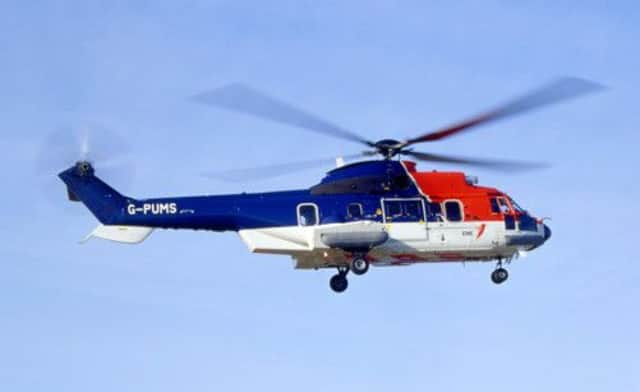CAA confirms North Sea helicopter safety review


The review will also focus on the causes of another four helicopter accidents and incidents in the North Sea overt the past four years, including the fatal crash in April 2009 in which a Super Puma plummeted from the sky, killing all 16 people on board.
The review will be undertaken jointly with the Norwegian CAA and the European Aviation Safety Agency.
Advertisement
Hide AdAdvertisement
Hide AdA spokesman for the UK’s specialist aviation regulator said: “It will study current operations, previous incidents and accidents and offshore helicopter flying in other countries to make recommendations aimed at improving the safety of offshore flying.”
He continued: “Although there has been considerable effort by regulators, operators and the offshore industry to minimise the risk of North Sea helicopter operations there have been five accidents in the past four years, two of which tragically resulted in fatalities.”
The review will cover a range of issues including pilot training and performance, helicopter airworthiness, the protection of passengers and crew, and the internal management of the main helicopter companies.
It will include a comparison study of UK operations with those in Norway and the findings of the review are due to be published in early 2014.
Mark Swan, Director of the CAA’s Safety and Airspace Regulation Group, said: “The recent accidents have understandably given rise to concerns, particularly with offshore workers who rely so heavily on these helicopter flights. We are absolutely committed to ensuring that operations are as safe as possible.”
The Government’s Air Accident Investigation Branch is still investigating the cause of the crash on 23 August in which a CHC-operated Super Puma AS332L2 crashed off the southern tip of the Shetland mainland.
Those who died were Sarah Darnley, 45, from Elgin, Gary McCrossan, 59, from Inverness, Duncan Munro, 46, from Bishop Auckland, and George Allison, 57, from Winchester.
In April 2009 another Super Puma AS332L2, operated by Bond, crashed on a flight from BP’s Miller field to Aberdeen, killing the two pilots and 14 passengers on board in what was the second-worst helicopter disaster in the history of the North Sea.
Super Puma ditchings
Advertisement
Hide AdAdvertisement
Hide AdLast year two Super Puma EC225s were involved in two separate ditchings. In October 2012 a Super Puma EC225 operated by CHC was forced to ditch off Shetland. And another EC225 ditched 30 miles off Aberdeen in May last year.
A background briefing on the new helicopter safety review by the CAA states: “An internal review of all reportable UK offshore public transport helicopter accidents during the period 1976 to 2012 has recently been prepared and delivered to the CAA Safety Action Group (SAG) and will subsequently be submitted to the CAA Board. The review established that the main causal factors of these accidents were operational (pilot performance), technical (rotor and transmission failures) and environmental (lightning strikes) factors.
“Set against this background and given the considerable amount of effort that has been invested by both regulatory authorities and operators into minimising the risks to safe operations in the North Sea, nevertheless, a total of five accidents (two of which tragically involved fatalities) have occurred in the last four years. Given that these accidents have involved the main causal factors mentioned above, other than lightning strikes, an urgent review of the overall safety performance levels that currently exist in the North Sea operational context is required. “”
‘Too little, too late’ - BALPA
But the British Airline Pilots’ Association (BALPA) has already branded the review as “too little - too late.”
A spokesman for the union said: “Our immediate reaction is this is too little, too late.”
He continued: “Firstly, the CAA has not shown itself adept at getting below the surface of industry, the real life experience of pilots and understanding the human factors that drive safety.
“Secondly, we believe a review needs to look at the totality of the commercial cut throat business that is the North Sea, and not just the helicopter operation. In short, just how high in the pecking order does safety really sit for an incentivised contract manager?
“Finally, any review must look at the role of the regulator in this trend of accidents. We are concerned that there does not appear to have been any pre-existing comparison of accident rates being maintained despite a series of accidents. In the light of this we just do not think it credible to expect the Regulator to review itself.”
Advertisement
Hide AdAdvertisement
Hide AdHe continued: “BALPA has called on the government to set up a judicial-led independent review along the lines of the post-Piper Alpha inquiry led by Lord Cullen. Today’s announcement by the CAA does not do it for us.”